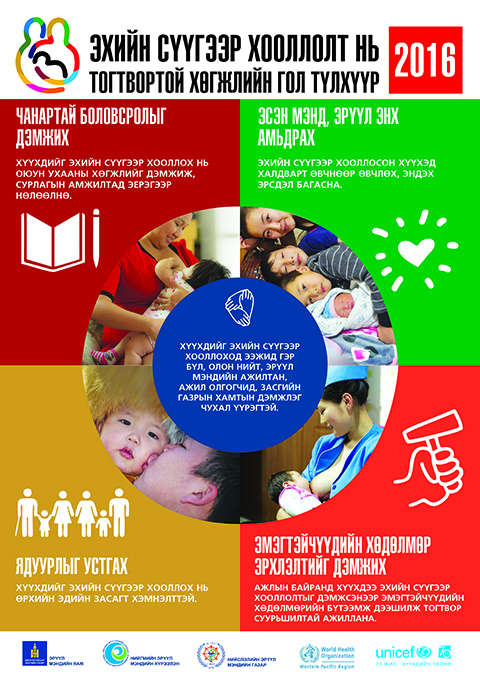The World Breastfeeding Week events annually co-organized by Mongolia’s Ministry of Health, Public Health Institute, Ulaanbaatar City Health Department, WHO and UNCEF was launched today with a beautiful lullaby Mongolian mothers sing to their babies, performed live by a star long-song singer.
The WBW is being celebrated this year under the slogan “Breastfeeding: A Key to Sustainable Development” as breastfeeding is critical in achieving several SDG goals, including the goal of ending hunger, improving nutrition and promoting health and well-being and reducing inequalities.
“Since increasing breastfeeding will create better possibilities for reaching SDG goals the state, private sector, communities and families should make a joint efforts in supporting breastfeeding and invest in raising a healthy and bright generation that will ensure the future sustainable development for our country,” said the recently appointed Minister of Health A. Tsogtsetseg addressing the gathering of distinguished guests including four newly elected female parliament members, national and international public health sector professionals, and the media.
Participants have noted that breastfeeding is naturally engraved into the Mongolian nomadic culture. However if in 2010 rates of exclusive breastfeeding of infants till 6 months of age in Mongolia reached 66%, in 2013 this number dropped to 47%, suggesting that only one in two Mongolian mothers exclusively breastfeed their babies for the first six months after birth.
The significant drop in breastfeeding has many socio-economic reasons behind including poverty and unemployment when mothers, especially single and poor ones, are forced to stop breastfeeding to be able to earn for living. Another reason is an aggressive advertising of breastmilk substitutes by transnational producers. There are 169 types of breastmilk substitutes produced in 11 countries that flood Mongolia’s markets. These companies have no legal limitation on advertising of their products.
“It’s clear that we need to protect mothers and babies from the companies that produce breastmilk substitutes and who do not shy away even from converting the health care staff in maternity wards to promote their products,” said Dr Soe Nyunt U, WHO Representative in Mongolia. “Hence we need to expand and strengthen health awareness and promotion especially to younger populations who are not aware of the benefits of breastfeeding to both: babies and mothers.”
WHO Representative also called upon partner organizations to “walk the talk” through setting up nursing rooms for working mothers in offices, at factories and in supermarkets to support breastfeeding as well as enable mothers to express breastmilk and store it in refrigerators to use later on.
Exclusive breastfeeding of babies till 6 months of age increases the chances of survival, improves immunity and healthy growth and protects from infections.
According to the health statistics almost half of about 100 infants up to 8 months old who have died in this year’s winter-spring measles outbreak in this country were bottle-fed babies.
The WBW event this year included a staged reading performed by the graduate students of the Mongolian University of Arts and Culture that highlighted the challenges of breastfeeding for working single mothers in a non-supportive environment underlining that breastfeeding isn’t only a responsibility of mothers towards their children but of the entire society towards the future generations.
As WHO Director General Margaret Chan and UNICEF Executive Director Anthony Lake said in their WBW 2016 joint message: “Breastfeeding is not only the cornerstone of a child’s healthy development; it is also a foundation of country’s development.”
In Mongolia, all the WBW messages will be distributed to the greater population during and beyond the WBW through artistic performances and a number of video and print breastfeeding promotion materials that were co-produced by the organizers.

